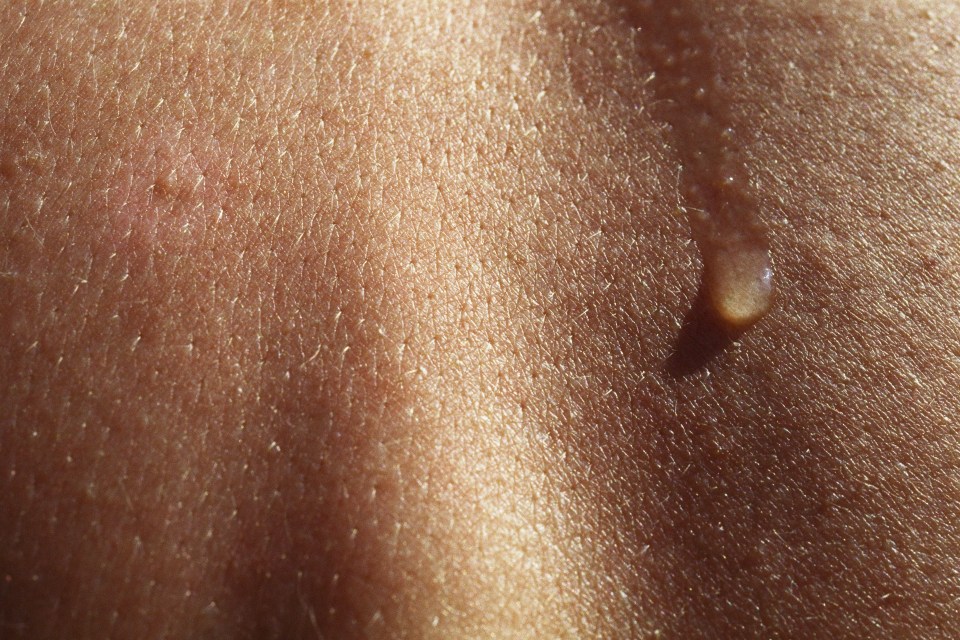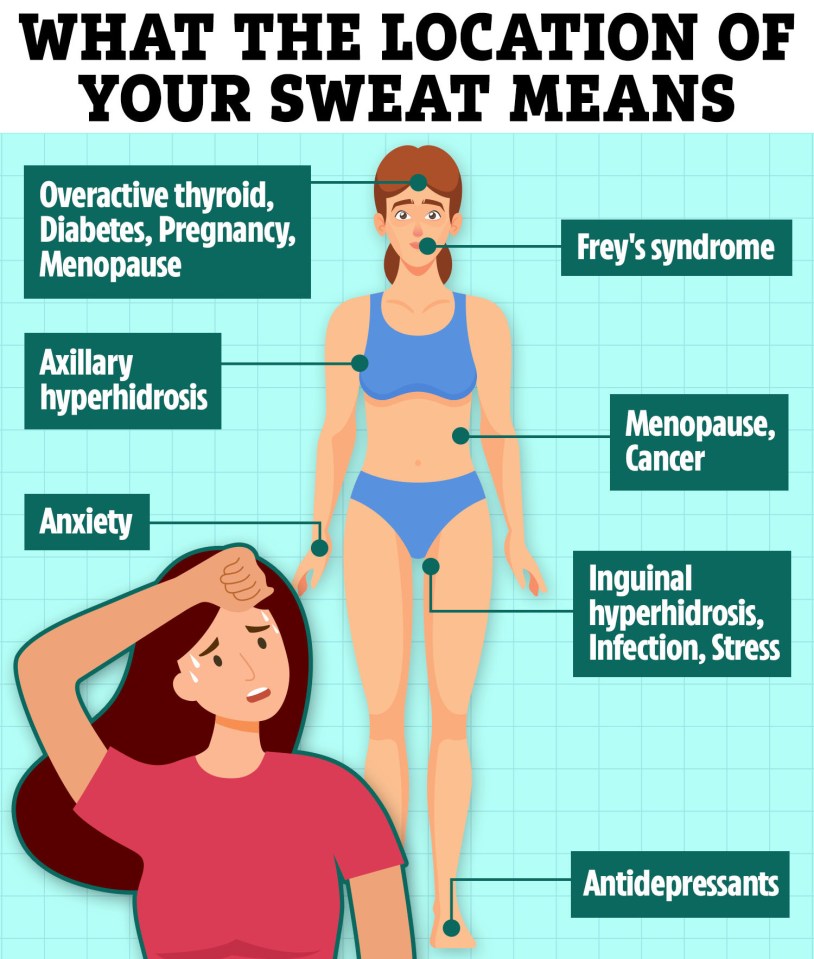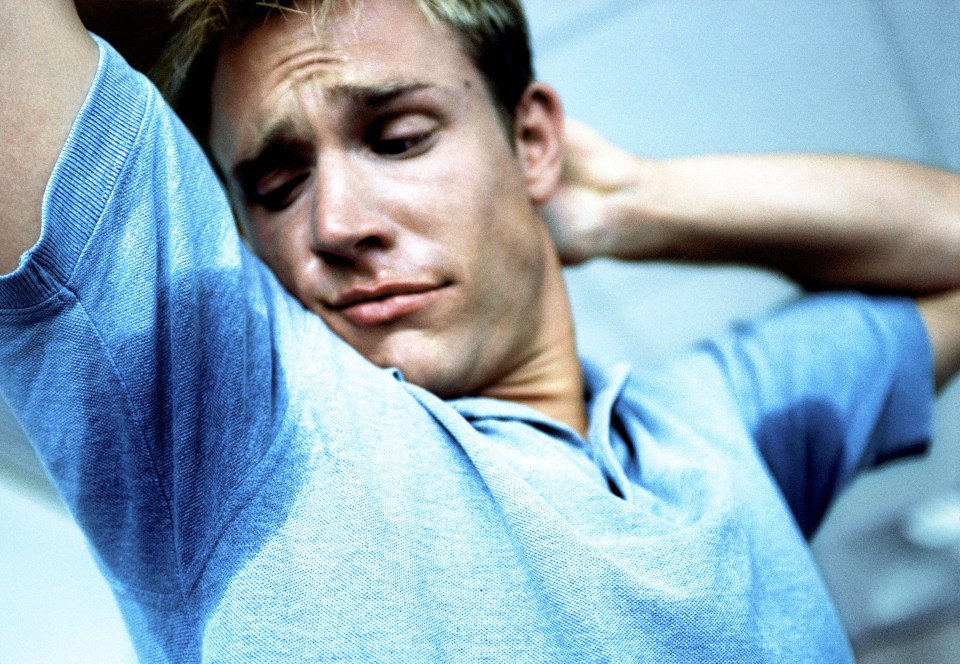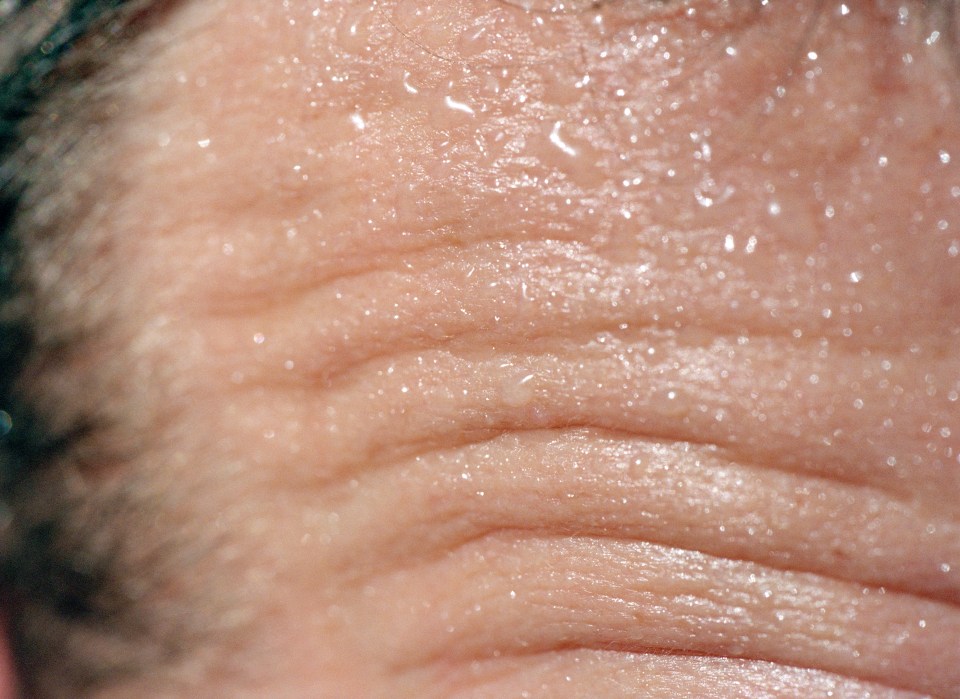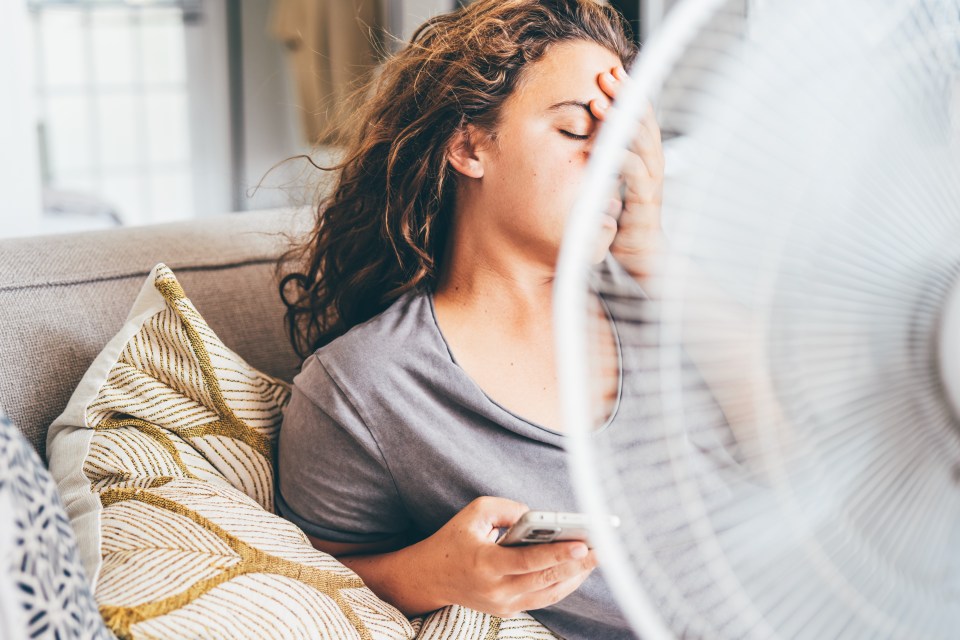IT’S one thing to be sweating in the gym after a workout or on holiday when the sun is beating down.
But what about if you find yourself with damp pits or a beady upper lip all the time? Perhaps even when you’re not warm at all?
Dr Luke Powles, associate clinical director at Bupa Health Clinics, tells Sun Health: “Sweating is the body’s natural way of keeping cool.
“When your internal temperature rises, whether from heat, exercise or stress, your sweat glands release fluid onto the surface of your skin.
“As this moisture evaporates, it helps to cool you down.”
It’s completely normal for some people to sweat more than others, and how much you sweat can be influenced by a range of factors.
“Those with a larger body mass may sweat more because their body generates more heat,” Dr Powles says.
“And if you’re physically fit, you might start sweating sooner during exercise.
“You may notice you sweat more in your younger years too, and men often sweat more than women, partly due to differences in body composition and hormone levels.”
But some people experience excessive perspiration even when there is no obvious reason.
Estimated to affect about two in every 100 people, hyperhidrosis is more common than you might think – and it can have a huge, negative impact on everyday life.
Dr Claudia DeGiovanni, consultant dermatologist at Nuffield Health Brighton Hospital, says: “Hyperhidrosis usually affects certain body areas, such as the armpits, palms, soles and scalp.
“Some people only get excessive sweating in one of these sites, while others are affected in multiple areas.
“The exact cause of hyperhidrosis is not known, but up to 30 per cent of patients will have a family member who is also affected.”
She adds: “Hyperhidrosis usually starts in the teenage years as the hormonal changes at this time result in the development and increased activity of the sweat glands.
“If excessive sweating develops later on in adulthood, especially suddenly, then there may be another medical cause for it and it would be sensible to see your doctor if this occurs.”
So what could the location of your sweat mean? And might it offer insight into the cause of your hyperhidrosis? We reveal all…
SWEATY PITS
MOST of us have experienced that annoying underarm sweat which seeps through our t-shirts – especially on days we’re wearing grey!
Although sweating from the armpits is a normal part of how the body regulates temperature, Dr Powles says that if you notice excessive or unexpected sweating in the armpit region, it could be a sign of axillary hyperhidrosis.
“While the exact cause isn’t always clear, it’s often linked to overactive sweat glands that receive excessive signals from the nervous system,” he says.
Thankfully, there are ways to treat axillary hyperhidrosis and put an end to damp pits.
“Strong antiperspirants containing aluminium chloride are often the first step,” he says.
“These help to block sweat glands and reduce moisture in the underarm area.”
Your GP may even refer you to a dermatologist.
“Botulinum toxin (Botox) can be injected into the underarms to temporarily block the nerves that trigger sweating,” adds Dr Powles. “This can offer relief for several months.
“In more severe cases, procedures such as sweat gland removal may be considered by your health professional.
“These are typically only recommended when other treatments haven’t worked.”
BEADY FOREHEAD
NOTICING that your forehead is often damp for no reason?
“Excessive sweating that cannot be explained by heat or stress on your forehead, face and scalp could be a sign of craniofacial hyperhidrosis,” says Dr Powles.
“This could be caused by overactive thyroid, type 1 or type 2 diabetes, pregnancy or menopause,” Dr DeGiovanni adds.
“An overactive thyroid may present alongside heart palpitations, intolerance to heat and weight loss.
“If you have diabetes you might also have excessive thirst, frequent urination and weight loss.
“One of the most important possible signs to look for is weight loss, which could happen in a few of these conditions.”
Frey’s syndrome can cause sweating in areas like the upper lip, cheeks or temples during meals
Dr Luke Powles
Explaining why diabetes can lead to excessive sweating, Dr Sarah White, associate clinical director at Bupa Health Clinics, says: “One reason may be nerve damage.
“Those with diabetes can sweat excessively when they’re eating or immediately after they’ve finished.
“Nerve damage can potentially affect the areas responsible for controlling sweat, meaning that people can sweat more than average, at times you might not expect, like when you’re eating.
“In some people, even thinking about food can trigger sweating.
“During low blood sugar episodes, the body goes into ‘emergency mode’ and releases stress hormones.
“This can trigger intense sweating, particularly on the face, neck and hands.”
Forehead sweating, as well as general excess sweating over your body, could also be due to an infection.
“When you have an infection, such as malaria or tuberculosis, your body sweats to regulate your temperature,” says Dr White.
To help get rid of a build up of oil and dirt, and reduce sweating, cleanse your face daily.
Botox injections, repeated every few months, can also help stop more serious sweating.
If you’re worried, visit your GP who can advise on the next steps.
SULA
DEALING with a case of sweaty upper lip alert (abbreviated to ‘sula’ by Emma Roberts‘ character in the 2008 film Wild Child)?
Dr Powles says it could be a sign of gustatory sweating, which occurs on the forehead, scalp, neck and upper lip during meals.
Frey’s syndrome is a rare but specific cause of gustatory sweating, usually triggered by surgery near the parotid glands, which are just in front of your ears.
“It happens when nerves that normally control saliva production mistakenly connect to sweat glands, causing sweating in areas like the upper lip, cheeks or temples during meals,” says Dr Powles.
The 10 best ways to stop sweating in hot weather
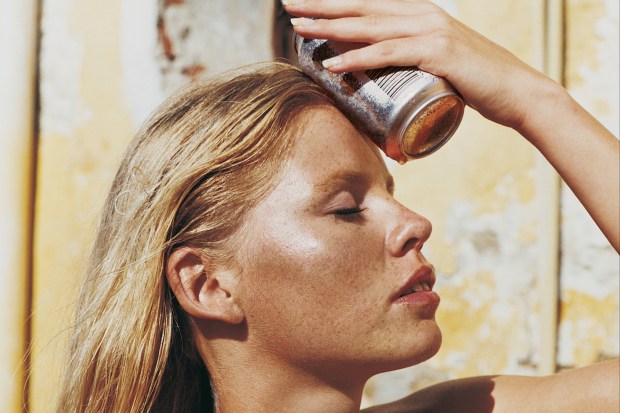
By Pete Barden, Digital Sub-Editor
WARMER weather doesn’t just mean beach days and barbecues – it can also be a total sweat-fest. So how do we combat it?
1. Drink up
It might seem counterintuitive to drink more to avoid sweating, but fluids help keep your body cool, so it doesn’t have to sweat as much to release extra heat.
“Dehydration can also lead to more sweating, as your body is working harder to stay functioning properly,” says personal trainer Tom Penn of F45 Training.
2. Cut the fat
“Foods high in fat can cause your insides to warm up as your body processes it, resulting in increased sweat,” says Abbas Kanani, a pharmacist from Chemist Click. This includes chips, crisps, cakes and processed meats.
Prioritise “good fat” olive oil, which is rich in antioxidants, easy to digest, boosts metabolism and helps regulate sweat levels.
3. Swerve spice
As you’d imagine, hot, spicy dishes can make you perspire more.
Cool down with yoghurt, and go big on fruits and vegetables with a high water content like watermelon and grapes to boost hydration.
4. Wear deo at night
“Antiperspirants work by blocking the sweat ducts so sweat can’t reach the surface of our skin,” explains Tom.
“For best results, apply this to clean, dry underarms before bed. The ingredients need time to create the block over the sweat duct and most people sweat less when in bed.”
5. Get a good kip
“If poor sleep is affecting hormone levels, and vice versa, it may trigger symptoms such as hot flushes, sweating and night sweats,” says Abbas.
Aim to get seven to nine hours of kip a night by implementing a calming bedtime routine – have a bath, dim the lights, avoid screens and write down anything that may be troubling you, so it’s out of your mind.
6. Check stress levels
Stress can cause your body temperature to rise, triggering sweat glands to kick in – hence why you might get sweaty palms and feet when scared or overexcited.
“Taking slow, deep breaths, holding the breath in for a few seconds and then releasing it, can help slow your heart rate and calm you down,” says Abbas.
7. Opt for cotton
Wear loose-fitting, breathable clothes made from cotton and avoid synthetic fabrics like nylon which trap moisture and can make sweating worse.
Tom adds that lighter colours help to reflect the sun rather than absorb it, so wearing white and cream can also keep you cool and dry.
8. Quit smoking
“Nicotine tells your body to release the chemical acetylcholine, which turns on the sweat glands,” says Abbas.
“It also raises your body temperature, heart rate and blood pressure.”
9. Try vinegar
Often, there’s some truth behind old wives’ tales.
“There are home remedies you could try, such as soaking a cotton ball in apple cider vinegar and applying it to your problem areas at night,” says Tom.
10. Block with botox
“Botox can be used to prevent the hyperstimulation of sweat glands, when there is no medical reason behind the sweating,” says Hazim Sadideen, consultant plastic surgeon at Cadogan Clinic.
“This is not a cure, but it does help control excessive sweating and is effective for six to 12 months.”
You may also experience a warm face and flushing.
“Spicy foods, hot drinks and alcohol can all increase facial sweating,” warns Dr Powles. Keep these to a minimum if you can.
“A medication called propantheline bromide is sometimes prescribed for this,” adds Dr De Giovanni.
If you’re concerned, book an appointment with your GP.
DAMP FEET
IF the soles of your feet are often damp with sweat, even when you’re not in a hot environment, then this could be plantar hyperhidrosis.
It basically means the sweat glands in your feet are overactive.
“In some cases, excessive foot sweating may be linked to secondary hyperhidrosis, which can be triggered by an underlying health condition such as a thyroid problem, diabetes or certain medications – specifically antidepressants and ADHD stimulants,” says Dr Powles.
Your footwear can also play a big role in how much your feet sweat.
“Shoes made from synthetic materials or those that are tight and non-breathable can trap heat and moisture, making symptoms worse,” adds Dr Powles.
Heavy work boots and waterproof shoes can be particularly problematic.
Where possible, choose breathable footwear made from leather or mesh.
Dr Powles adds: “Wearing the same shoes every day without allowing them to dry out can also contribute to discomfort and odour.
“Avoid wearing the same pair two days in a row.”
Dr DeGiovanni recommends using cornflour to help absorb excess moisture and manage any nasty smells.
“If the feet are wet, this can lead to infections of the skin such as athlete’s foot and may require antifungal treatment,” she adds.
“Using natural fibre socks can help, and silver or copper impregnated socks are also beneficial for some people.”
You could even try iontophoresis – a treatment that uses a gentle electrical current to reduce the activity of sweat glands.
Although it’s usually done in a clinic, home-use devices are also available.
Excessive sweating on the back could lead to clogged pores and make you more likely to develop acne
Dr Claudia DeGiovanni
“Iontophoresis can be very helpful for treating hyperhidrosis of the palms and soles,” Dr DeGiovanni says.
“Patients place their hands in a tray of water for about 20 minutes at a time. The machine creates a current that runs through it.
“Initially, seven treatments are needed and then it can be reduced to once or twice a week to control symptoms.”
If you’re concerned about how much you sweat or if it’s affecting your wellbeing, Dr Powles recommends speaking to your GP.
“They can help identify any underlying causes and discuss treatment options if needed,” he says.
“If you think that you have excessive sweating due to medication, then do not stop your treatment until you have spoken with your doctor,” adds Dr DeGiovanni.
CLAMMY PALMS
ARE the palms of your hands often clammy or damp?
While a common feature of hyperhidrosis, this can also occur when someone is anxious.
“It indicates that the ‘fight or flight’ response – the body’s reaction to stress – has been activated,” Dr DeGiovanni says.
“Other symptoms may include an increased heart rate, heart palpitations, quicker breathing, dizziness and feeling sick.”
WHEN TO SEEK HELP FOR NIGHT SWEATS
USUALLY, night sweats are annoying and uncomfortable, but largely treatable.
Make sure your bedroom is a cool 16C to 18C, and that your bedding and nightwear is cotton, lightweight and breathable.
If you’re soaking through your sheets regularly though and you’re worried, speak to your GP.
Dr Nadira Awal, Doctify-rated GP, says: “The investigation of night sweats is crucial for several reasons.
“Firstly, they can significantly impact a person’s quality of life, disrupting sleep and leading to daytime fatigue, mood changes, and decreased productivity.
“Secondly, night sweats may be an early warning sign of a more serious underlying condition that requires prompt diagnosis and treatment.”
Dr Martin Thornton, chief medical officer at Bluecrest, adds: “If night sweating is the sign of something more serious, it rarely appears alone.
“Keep a symptom diary to talk to your healthcare professional about your night sweats in the context of your general health.”
Whatever the cause, sweaty palms can make some tasks pretty difficult.
For starters, it is much harder to hold a pen and take notes.
“Some people also find it difficult to shake hands, and the anxiety caused by embarrassment may make the situation worse,” adds Dr DeGiovanni.
If you think you may be suffering from anxiety, there is help available.
You can refer yourself directly to an NHS talking therapy service without a referral from a GP. Your doctor will also be able to discuss medication options with you.
BACK SWEAT
IT’S not abnormal to experience back sweat, especially when exercising or wearing a backpack.
But heavy sweating across large areas of the body, such as the back, shouldn’t be ignored – particularly at night.
“Night sweats are common in menopause,” says Dr DeGiovanni. “Along with hot flushes, they’re known as vasomotor symptoms.
“As levels of the hormone oestrogen fluctuate and decline, this affects the brain’s thermostat (the hypothalamus), triggering the cooling mechanisms of the skin and sweating.”
If you think you might be entering menopause and you’re experiencing uncomfortable symptoms such as excessive sweats, book an appointment with your GP.
“Hot flushes and night sweats are often very responsive to oestrogen replacement in HRT,” adds Dr DeGiovanni.
Wear loose-fitting clothes made from natural fabrics like cotton to help reduce moisture build-up and have regular showers
Dr Luke Powles
Heavy, regular night sweats are sometimes linked to blood cancers like leukaemia and lymphoma, though this is rare.
Other symptoms can include unintentional weight loss, breathlessness and persistent itching.
If you’re worried, book an urgent appointment with your doctor.
Dr DeGiovanni adds: “Excessive sweating on the back could lead to clogged pores and make you more likely to develop acne.
“Wearing clothing made from natural fibres like cotton can help wick the fluid from the skin.”
SWEATY GROIN
SWEATING between the legs can be uncomfortable and irritating.
It can cause chafing, infections and even start to smell.
“It could be a sign of a condition known as inguinal hyperhidrosis,” says Dr Powles.
This can be a form of primary or secondary hyperhidrosis caused by an underlying health condition, such as diabetes, menopause, an infection or hyperthyroidism.
Groin sweat may also be due to stress.
Because the location is warm and prone to friction from movement and clothing, it can lead to other problems such as itching, a fungal rash, vaginal yeast infections and chafing.
These in turn can make sweating worse.
“Wear loose-fitting clothes made from natural fabrics like cotton to help reduce moisture build-up and have regular showers to keep clean,” Dr Powles says.
“Trimming pubic hair can help maintain hygiene and reduce moisture too.”
See your doctor if your groin sweat is disrupting your day-to-day activities, if you notice any unusual vaginal discharge or smell, or if your sweating is also accompanied by unexplained weight loss or heart palpitations.


